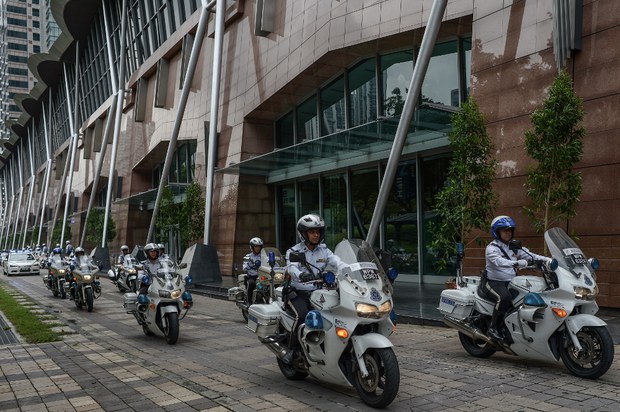Southeast Asia on Alert for Possible Attacks
2015.11.16
 Malaysian police train outside the Kuala Lumpur Convention Centre ahead of the 27th ASEAN Summit, Nov. 16, 2015.
Malaysian police train outside the Kuala Lumpur Convention Centre ahead of the 27th ASEAN Summit, Nov. 16, 2015.
As Kuala Lumpur prepares to host the 27th Association of Southeast Asian Nations (ASEAN) Summit, which starts Wednesday, member nations including Malaysia, Indonesia and Thailand are pledging to share intelligence and combat terrorism.
Following deadly terrorist attacks in Paris and Beirut last week claimed by the Islamic State (IS) extremist group, ASEAN host-country Malaysia is taking steps to ensure the safety of dignitaries attending the summit, which will go through Sunday.
The Royal Malaysia Police’s counter-terrorism branch has assigned special action teams from its elite Special Action Unit (UTK) as backup for the security details protecting delegations from the various ASEAN member-states, as well as the United States, China, Japan, India and Russia, The Star newspaper reported Monday. It quoted Senior Assistant UTK Commander Hazani Ghazali as saying that 300 personnel would be on duty during the summit.
Strong collaboration among ASEAN nations would go a long way toward curbing terror threats, said P. Sundramoorthy, an associate professor of criminology at University Science of Malaysia.
“These individual cells realized that it is difficult now for them to join the IS militants in Syria and Iraq, so it is possible that they are mulling to mobilize to establish an Islamic State in the other parts of the world, including their own countries,” Sundramoorthy told BenarNews.
“For me, the threat from a terror faction in this region is not immediate, but I must stress that we must not underestimate what they are trying to do.”
He was commenting after the Straits Times of Singapore reported on Saturday that a group of wanted Malaysian militants was looking to start a Southeast Asian chapter of IS, by merging terrorist groups in Malaysia, Indonesia and the Philippines, such as Jemaah Islamiyah and Abu Sayaf.
The next day, The Star newspaper quoted Malaysian Defense Minister Hishammuddin Tun Hussein as saying that IS had put him and other officials on a hit list.
Bangladesh tightens security
Meanwhile in Bangladesh, the government on Sunday upgraded security by deploying an armed battalion of police at parliament.
“The attacks in Paris and Lebanon and the series of machete attacks over the last month have really made us worried about the [Jatiyo] Sangsad [parliament] security. [The militants] may target our highest seat of democracy,” Deputy Parliamentary Speaker Fazle Rabbi Miah told BenarNews, referring to recent attacks on bloggers and publishers.
Hours after the Paris attacks, Speaker Shirin Sharmin Chaudhury authorized Miah to hold an emergency meeting with Home Minister Asaduzzaman Khan Kamal and security agencies.
“We are bound to root out terrorism. Terrorism has no place in democracy. We are capable of curbing terrorism,” Chaudhury told BenarNews.
Bangladesh has been on a heightened security alert following a series of attacks including the Sept. 28 killing of Italian aid worker Cesare Tavella and the Oct. 3 killing of Japanese researcher Kunio Hoshi.
IS has claimed responsibility for those killings and the bombing of a Shiite religious procession on Oct. 24. Khan has rejected IS claims that it has a foothold in his country, linking those incidents and others to domestic militant groups.
Indonesia, Thailand officials act in wake of attacks
Elsewhere, Jakarta Regional Police spokesman Muhammad Iqbal told BenarNews that Indonesia was imposing strict security at foreign embassies, prioritizing European nations, Australia and the United States.
“President Jokowi has stressed the importance of international cooperation in combating terrorism,” Indonesia Foreign Minister Retno Marsudi said. “No country is safe from terrorism, so the way to tackle it is by working together.”
In Thailand, Deputy Prime Minister Gen. Prawit Wongsuwan called a meeting of police, military and security officials, specifically focusing on IS members.
We have tightened security measures along the checkpoints and borders, especially at the Malaysia-Thai borders. IS was previously found moving into Malaysia. We also track any cyber movement,” he said.
Kamran Reza Chowdhury, Pimuk Rakkanam, Arie Firdhaus and S. Adie Zul contributed to this report.







